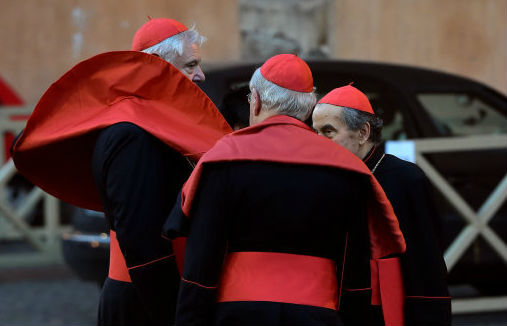The four “dubia” cardinals, who back in September asked the Pope to clarify the doctrinal consequences of his exhortation Amoris Laetitia, asked for an audience with Francis in May, but are yet to receive a reply, a recently published letter has revealed.
In a letter, dated 25 April, and hand-delivered to the Pope in May, Cardinals Carlo Caffarra, Walter Brandmüller, Raymond Burke and Joachim Meisner wrote to Francis asking for an audience, having received no response to the letter containing their five questions, or doubts (dubia) they sent him on 19 September last year.
The letter, revealed by Edward Pentin of National Catholic Register yesterday (19 June) evening, is the latest in a series of events linked to the controversy surrounding Amoris Laetitia, the Pope’s summary document on the 2014 and 2015 Synods on the Family.
The document, some critics have argued, may have profound consequences on the moral theology of the Church — especially the famed Eighth Chapter, which raises the possibility of an opening for the divorced and remarried to receive Holy Communion.
The 25 April letter, signed by Cardinal Caffarra on behalf of the four, begins by stressing the cardinals’ allegiance to the Pope.
They state that it is an “awareness of the grave responsibility” of their office as “advisers of the Successor of Peter in his sovereign ministry” that has moved them to ask the Pope for a meeting.
Caffarra noted that a year since its publication, “interpretations of some objectively ambiguous passages” of Amoris Laetitia have been given that are “not divergent from, but contrary to, the permanent Magisterium of the Church.”
Since the document’s publication, several episcopal conferences - including those of Belgium, Malta, Germany and Sicily - have seen Francis’ exhortation as asking for a more pastoral response to the divorced and remarried. They have argued that once a process of awareness and forgiveness is complete, the divorced and remarried cannot be denied access to the Eucharist.
Most recently, the Sicilian episcopal conference stated, in a 14-page document, that “no one can be condemned forever.”
However, although some bishops have taken Francis’ document as a cue to introduce more realism than legalism in their pastoral care, others, such as the Polish episcopates, have denied that Amoris Laetitia changes Church theology in any way.
Cardinal Gerhard Müller, prefect of the Congregation for the Doctrine of the Faith and notable theological conservative, has joined voices with the Polish bishops in arguing that Francis’ exhortation in no way changes Catholic moral teaching. Unless a remarried couple live as “brother and sister” holy communion remains inaccessible to them, he has said.
These differing interpretations are causing “doctrinal anarchy”, write the “dubia” cardinals in the recently published letter.
“And so it is happening — how painful it is to see this! — that what is sin in Poland is good in Germany, that what is prohibited in the archdiocese of Philadelphia is permitted in Malta. And so on,” Cardinal Caffarra wrote. Quoting the 17th century French theologian Blaise Pascal, he added: “Justice on this side of the Pyrenees, injustice on the other; justice on the left bank of the river, injustice on the right bank,” states the letter.
Caffarra also recalled a “very well attended” Vatican seminar of concerned lay experts who discussed the theme of “bringing clarity” to the document on 22 April.
“Faced with this grave situation, in which many Christian communities are being divided, we feel the weight of our responsibility, and our conscience impels us to ask humbly and respectfully for an audience,” Cardinal Caffarra said in closing.
In the past, in commenting on the chain of events that followed the publication of Amoris Laetitia, Francis said that “critiques do help”, but it has also been said that he thought that the highly publicised manner in which the original “dubia” were raised was not very tasteful.
PICTURE: German cardinal Gerhard Ludwig Muller (left) and Italian cardinal Carlo Caffarra (right) talk with a third cardinal during the synod on themes of family, sex and marriage in 2014 at the Vatican




 Loading ...
Loading ...